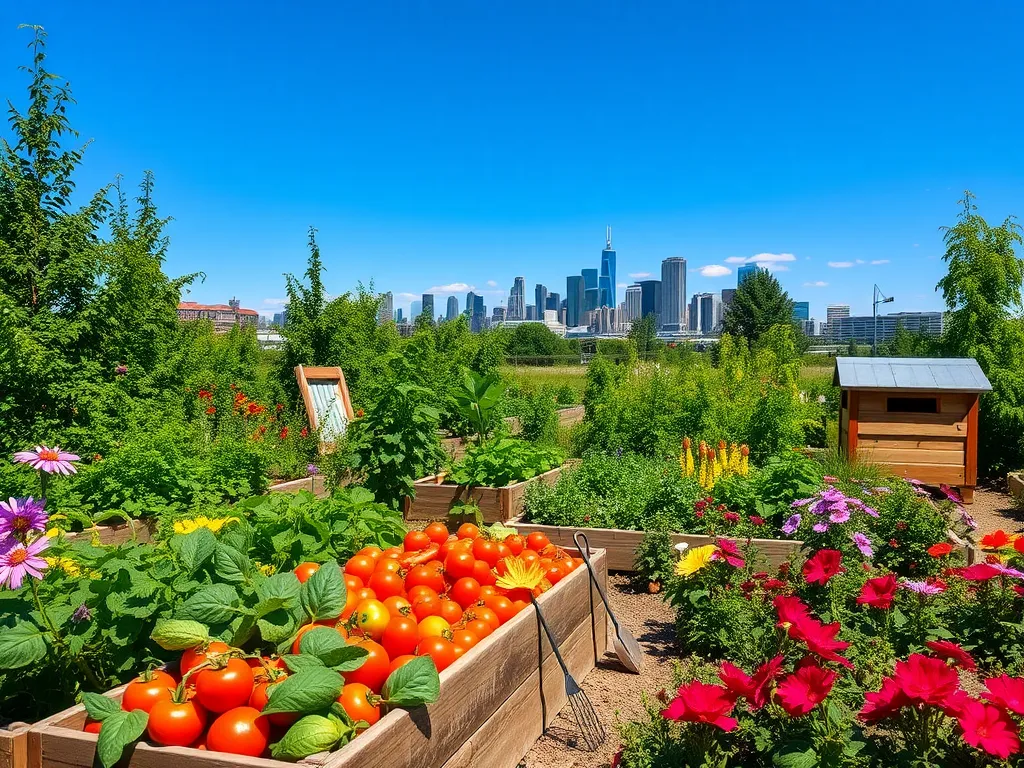Community Gardens in YYC: Your Guide to Local Food Production

Community Gardens in YYC: Cultivating Community and Sustainability
Community gardens in YYC are vibrant spaces where residents come together to grow fresh produce, foster community connections, and promote sustainability. These gardens serve as a crucial resource for individuals and families, providing access to healthy food options while enhancing the beauty and ecological health of the urban environment.
The rise of community gardens in YYC reflects a growing interest in local food production and environmental stewardship. By transforming vacant lots and underutilized spaces into productive gardens, communities are not only improving access to fresh, organic vegetables but are also creating spaces for cultural exchange and shared learning experiences. Community gardens in YYC help bridge the gap between diverse groups and encourage collaboration among local residents.
One of the key aspects of community gardens in YYC is their focus on education. Many gardens offer workshops and programs that teach sustainable gardening practices, nutritional cooking, and environmental awareness. This educational component empowers individuals with knowledge and skills that can be applied at home and in their neighborhoods, enabling a more profound understanding of the food system and local ecology.
Community gardens also play a significant role in promoting mental and physical well-being. Gardening has been shown to reduce stress, improve mood, and increase physical activity. By participating in community gardens, YYC residents can enjoy these health benefits while engaging in a collective effort to beautify their surroundings and nurture their local environment.
As YYC continues to grow, the importance of community gardens cannot be overstated. They offer a practical solution to food security, foster community spirit, and encourage sustainable practices that benefit both people and the planet. The ongoing development of these green spaces will ensure a healthier, more connected, and resilient community for years to come.
Benefits of Community Gardens
One of the most significant benefits associated with community gardens is the accessibility to fresh, nutritious produce. By growing their food, local residents can enjoy a variety of seasonal fruits and vegetables that contribute to a healthy diet, ultimately reducing reliance on processed foods and improving overall public health.
Community engagement is another essential benefit of community gardens. These gardens serve as a gathering place for individuals of all ages and backgrounds to come together, socialize, and collaborate on gardening projects. This interaction fosters a sense of belonging and strengthens social ties, making neighborhoods more cohesive and supportive.
The environmental impact of community gardens is profound. By increasing green spaces in urban areas, these gardens contribute to biodiversity, provide habitats for wildlife, and play a role in mitigating urban heat. Implementing sustainable gardening practices, like composting and rainwater collection, further enhances the gardens' positive environmental impact, promoting ecological health.
Educational opportunities abound in community gardens, offering hands-on experiences for both children and adults. From workshops on gardening basics to lessons about the importance of pollinators, these programs empower individuals to make informed decisions related to food and the environment. Such educational initiatives help cultivate a new generation of environmentally-conscious citizens.
How to Start a Community Garden
To establish a community garden in YYC, the first step is to find the right location. Ideal spaces include vacant lots, parks, or schoolyards that are accessible and have adequate sunlight. Engaging local authorities and community organizations can help identify suitable areas while ensuring compliance with zoning regulations.
Gathering community support and volunteers is vital for the success of a community garden. Hosting meetings, reaching out through social media, and connecting with local gardening groups can help build enthusiasm and encourage participation. Creating a steering committee can also provide leadership and organization to garden planning efforts.
Securing funding and resources is an essential aspect of starting a community garden. This can be achieved through grants, donations from local businesses, and partnerships with gardening supply companies. Fundraising events and community campaigns can also raise awareness and generate the necessary financial support for the project.
Planning the garden layout and design is crucial for maximizing space and resources. Considerations should include crop rotation, accessibility, and community involvement in the design process. An inclusive approach can foster a sense of ownership and pride among community members, making them more invested in the garden's success.
Volunteer Opportunities
Volunteer opportunities abound within YYC's community gardens, making it easy for residents to get involved. Many gardens actively seek volunteers to assist with planting, weeding, harvesting, and maintaining the garden beds. These roles provide a chance to learn and develop new gardening skills while contributing to a meaningful cause.
Types of volunteer work available in community gardens can vary greatly. From hands-on gardening tasks to organizing events and educational workshops, there are many ways to lend a helping hand. Volunteers may also help with administrative tasks, fundraising efforts, or community outreach projects, ensuring that there is something for everyone to do.
Volunteering in community gardens offers numerous benefits, including the opportunity to connect with like-minded individuals, learn more about sustainable gardening practices, and experience the joy of working collectively towards a shared goal. These experiences can foster lasting friendships and create a sense of belonging within the community.
Many community gardens provide training programs for new volunteers, offering valuable insights on gardening techniques, pest management, and soil health. These workshops not only equip individuals with practical skills but also promote the importance of sustainability and ecological awareness, creating a knowledgeable community of gardeners.
Local Produce and Seasonal Gardening
Understanding seasonal crops in YYC is essential for successful gardening. The climate in YYC allows for a diverse range of crops, including potatoes, carrots, and various leafy greens. Knowing when to plant and harvest these crops helps gardeners maximize yield and enjoy fresh produce throughout the growing season.
Tips for planting and harvesting in YYC's unique climate include starting seeds indoors, using row covers to protect against frost, and adhering to local planting calendars. Additionally, being aware of the specific microclimates in the area can help optimize growing conditions, ensuring that crops thrive even in unpredictable weather.
Best practices for organic gardening are vital for maintaining healthy soil and promoting biodiversity. These practices include crop rotation, natural pest control methods, and the use of organic fertilizers. Community gardens can serve as demonstration sites for these techniques, promoting sustainable gardening practices within the broader community.
Creating a diverse plant community within community gardens can enhance overall resilience and improve insect pollination. By incorporating various types of plants, including flowers, herbs, and vegetables, gardeners can cultivate an ecosystem that supports beneficial insects and promotes healthy soil.
Connecting with Local Food Networks
In YYC, several community garden associations exist to support the development and growth of these green spaces. Organizations such as the Calgary Horticultural Society and local community associations provide resources, networking opportunities, and educational programming designed to promote and strengthen the community gardening movement.
Partnerships with local farms and markets can enhance the impact of community gardens in YYC. Collaborating with these entities can provide access to resources, such as seedlings or expert advice, while fostering a local food network that encourages the purchase and consumption of locally-grown produce.
Promoting food security through community initiatives is a key focus of many community gardens. By growing fresh produce and distributing it to those in need, these gardens play an essential role in addressing hunger and food insecurity within the city. This food-sharing aspect creates a sense of community and support among residents.
Events and workshops for aspiring gardeners serve as a fantastic way to connect individuals with local food networks. These gatherings can provide valuable information on gardening techniques, seasonal planting schedules, and even cooking demonstrations, ultimately promoting a culture of food appreciation and sustainability within the community.
